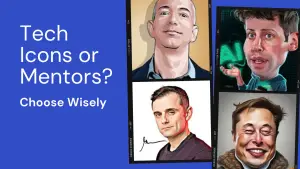“Try to be useful. Do things that are useful to your fellow human being.” – Elon Musk
“Do something you are passionate about, and don’t chase the hot passion of the day.” – Jeff Bezos
“(For new graduates) This is exactly the time to go live in Bali for a year. This is exactly when you try to become Beyoncé.” – Gary Vaynerchuk
Our career journeys can be long and full of important decisions, so we value good advice. However, it’s often hard to ask for help. When we see a compelling quote or reel from a successful person, we might take it as the ultimate guidance. It seems logical to follow advice from those more successful than us, right?
However, Dalton Caldwell and Michael Seibel from Y Combinator highlight the advice paradox: “Do as I say, not as I did.” They worked with Sam Altman (OpenAI CEO) and Peter Thiel (PayPal co-founder) before they became well-known tech entrepreneurs. Interestingly, some of their advice doesn’t align with their own actions. For example, Peter Thiel advises against going to college, yet he attended both undergraduate and law school at Stanford University. Caldwell and Seibel argue that while criticizing the higher education system is valid, many tech leaders, including Thiel, found their co-founders and built their networks in college.
They suggest that while the advice is well-intentioned, it often reflects what these gurus would do now, rather than what they actually did. It’s human nature to forget our backstories and offer advice based on our current perspectives.
Personalization

Learning from prominent figures isn’t inherently wrong, but it should be balanced with personalized advice from someone who knows you, like a mentor. Author and speaker Simon Sinek says mentorship is often misunderstood. It’s not about emailing someone you respect and asking them to be your mentor. Instead, mentor relationships develop like friendships, where both parties teach and learn from each other.
Mentoring is essential but should not be confused with having a champion. A champion might advocate for you during a promotion process, while a mentor might not even work in your field.
A wise proverb states, “In an abundance of counselors there is safety,” suggesting you shouldn’t rely solely on one mentor. Having multiple mentors can provide a broader range of perspectives, reducing the influence of individual biases and limitations.
We shouldn’t disregard the insights of accomplished individuals. In fact, I’ve benefited from mentors who love to read and have recommended books that sparked valuable discussions about applying key insights to my journey.
Choose Wisely
While it’s tempting to follow the advice of popular tech gurus, true guidance often comes from personal connections. Ironically, Bill Gates credits much of his success to the mentorship he received from Warren Buffett. So, before packing your bags for Bali, consider consulting your mentor(s) to see if it’s really the best move for you. They might have been there and could recommend a great visit spot—after you get your first promotion, not right after graduation.
Need career coaching advice for your specific situation?
Click here to learn more: https://paperbell.me/ruben-garcia


